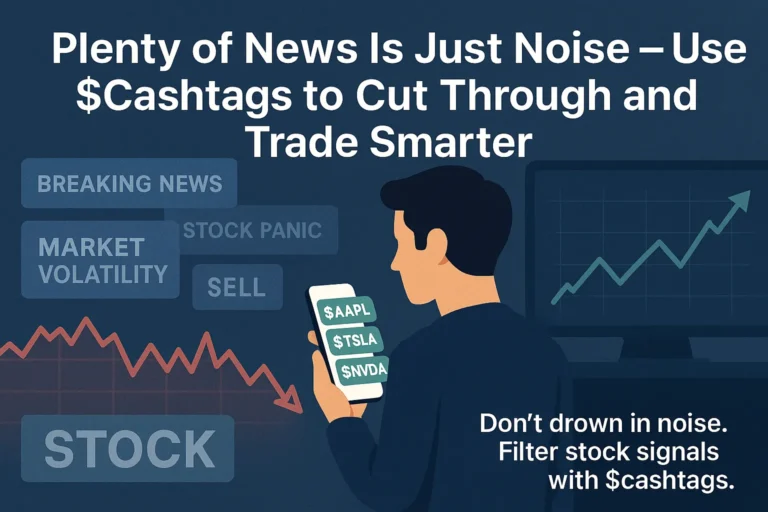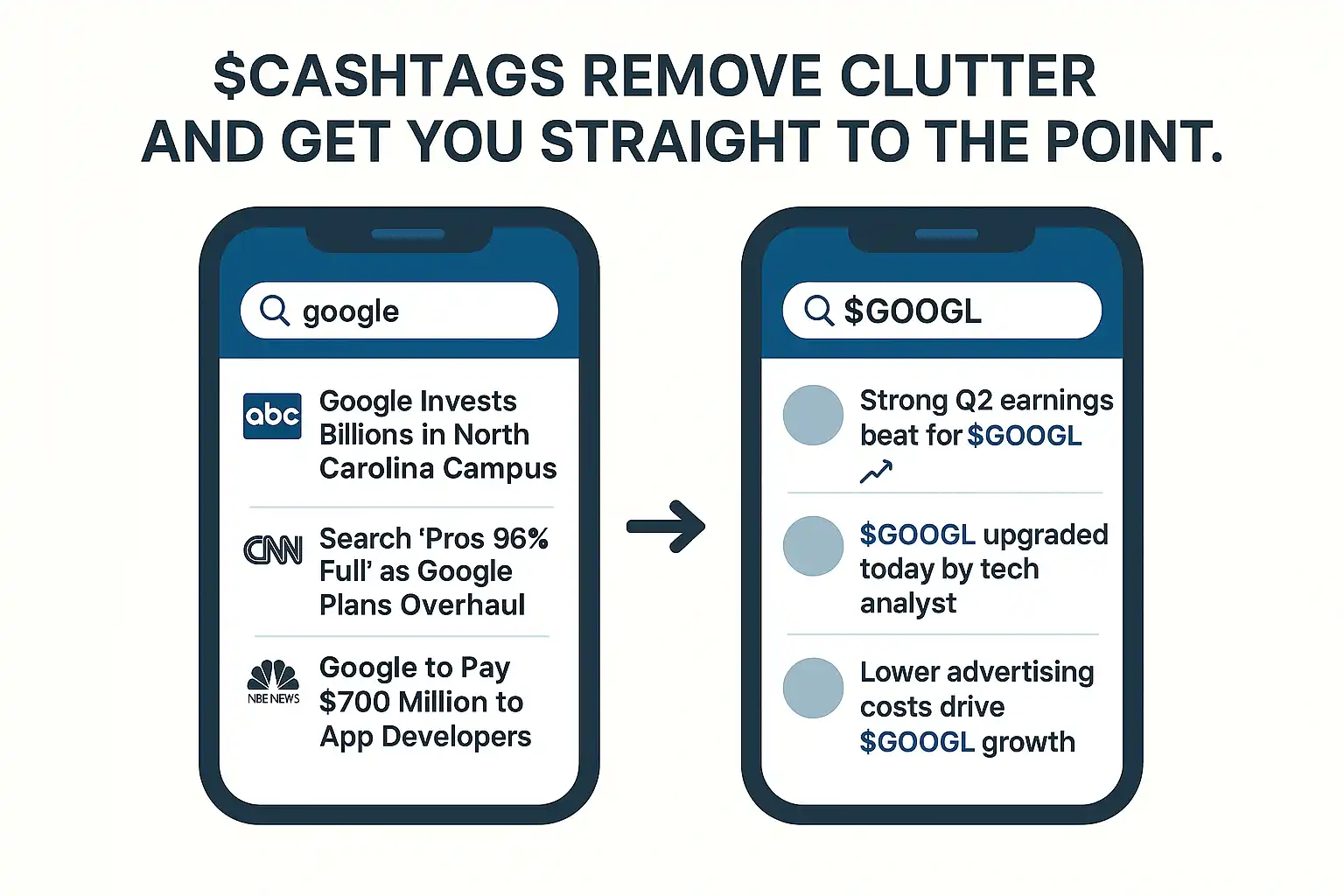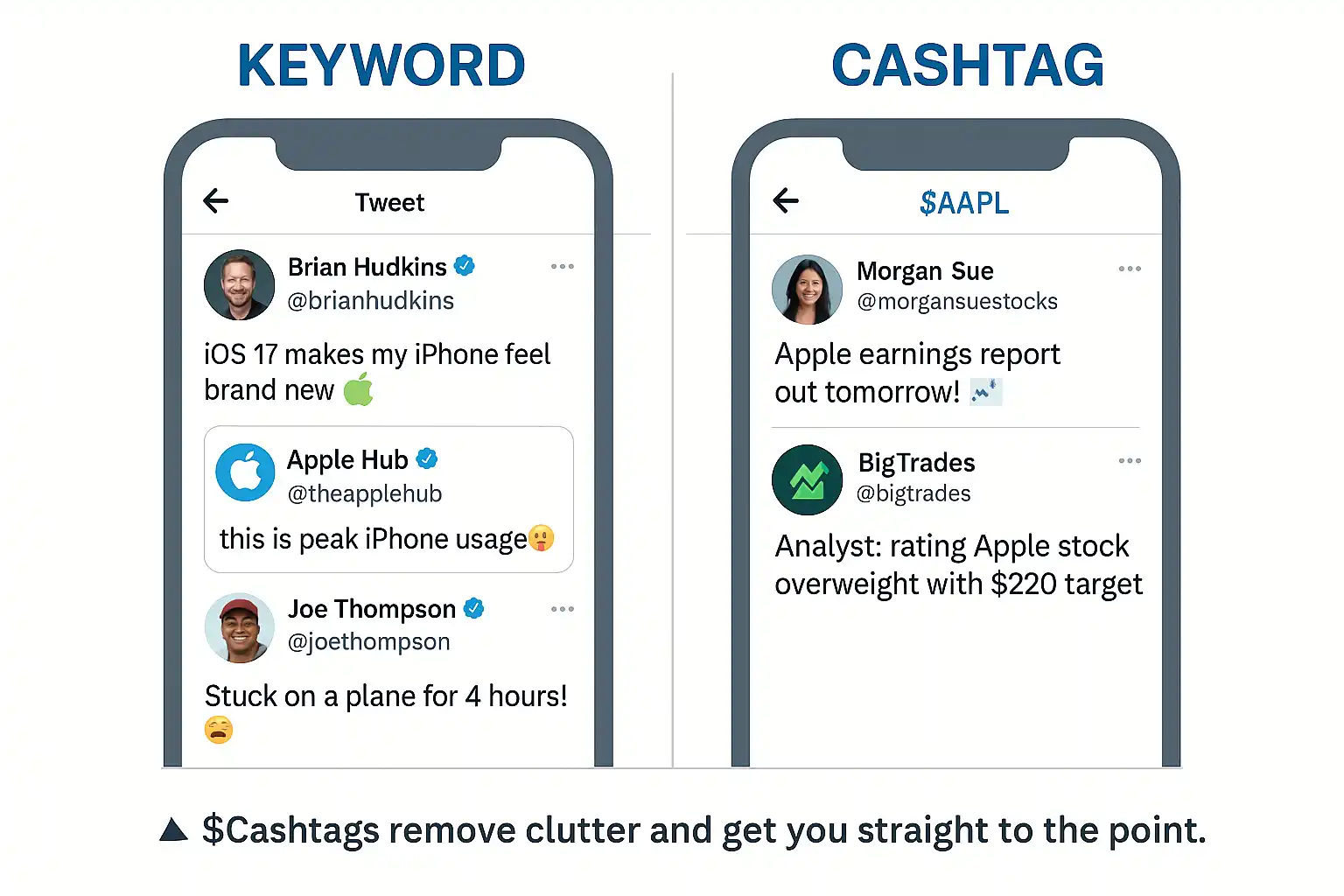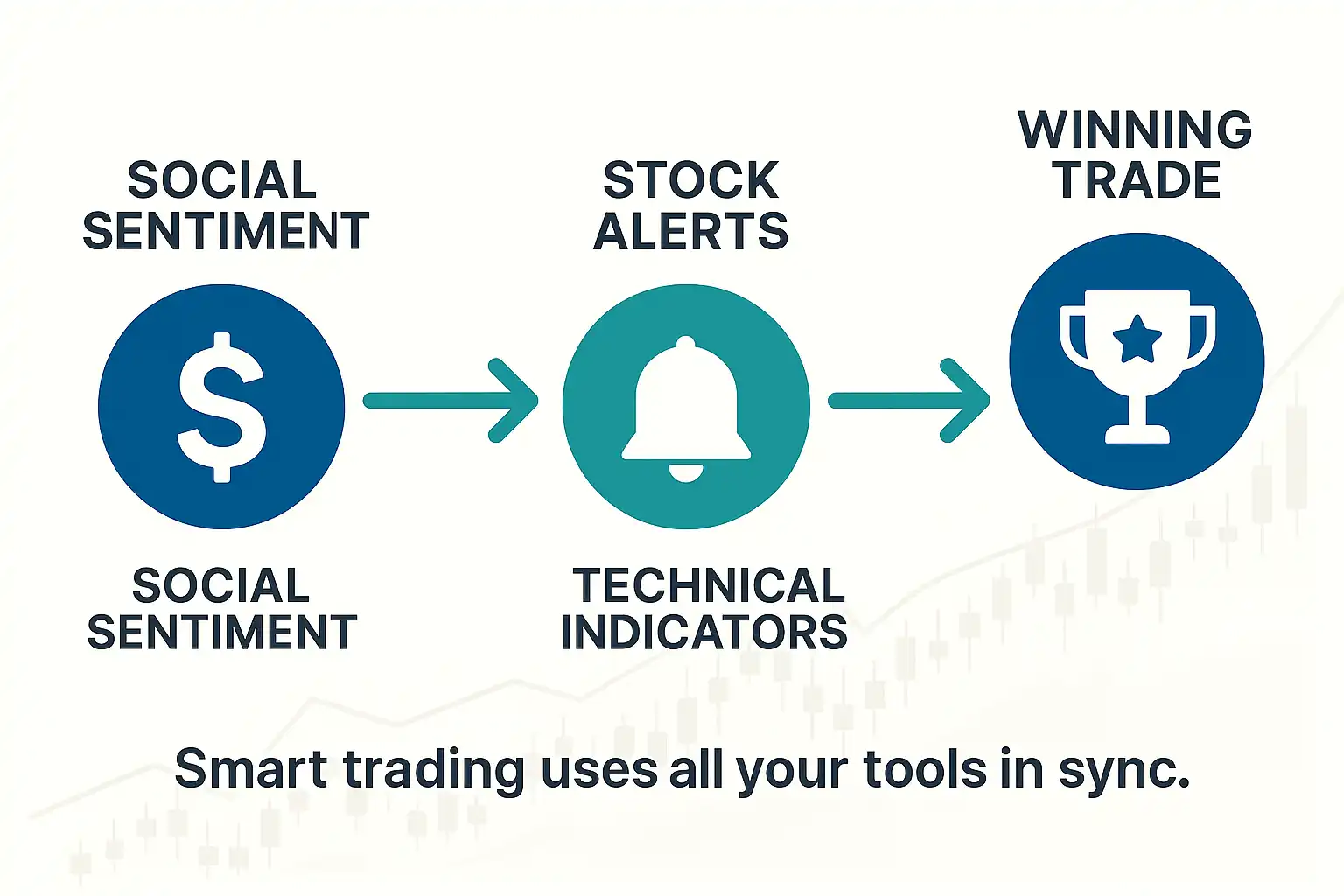
Plenty of News Is Just Noise — Use $Cashtags to Cut Through and Trade Smarter
📌 Summary: Why Cashtags Are a Game-Changer
With thousands of financial headlines pushed out daily, most of what we read isn’t useful — it’s just noise. But $cashtags on Twitter and StockTwits help cut through the chaos. Learn how smart traders use them to stay informed, avoid hype traps, and act faster than the crowd.
⏱️ Estimated Read Time: 5 minutes
📚 Table of Contents
- Why Most Stock Market News Is Just Noise
- How $Cashtags Work — And Why They Matter More Than Ever
- Case Study: How One Trader Uses $Cashtags to Stay Ahead
- Visual Guide: Cashtag vs. Keyword Search
- Expert Opinions on Using Social Signals for Trading
- Combining $Cashtags With Stock Alerts and Technical Tools
- Final Take: Filter Faster, Trade Smarter
🚫 Why Most Stock Market News Is Just Noise
“If you react to every headline, you’re not investing — you’re gambling.”
— Paul Tudor Jones
In today’s fast-paced trading environment, you’re exposed to a firehose of information. Financial headlines flood your phone, your inbox, and your social feeds 24/7. But here’s the truth:
Most of that news is just noise.
According to Bloomberg, less than 10% of financial headlines contain information that leads to a profitable market move. The other 90%? They’re recycled stories, regurgitated PR, or general commentary designed to get clicks — not results.
🧨 Real-Life Example: The Misleading Headline Trap
Imagine you see a headline on a trading app: “Tesla Warns of Production Delays in China.” You panic-sell $TSLA, only to realize later the article was referencing a statement from four months ago — republished with a new title.
You just traded on stale info that had already been priced into the market.
Not all news is actionable. **Timing + context** are everything.
✅ Pros & ❌ Cons of Headline-Driven Trading
- ✅ Keeps you aware of breaking developments
- ✅ Can signal macroeconomic shifts quickly
- ❌ Often republished or irrelevant content
- ❌ Can trigger emotional trades based on outdated info
📘 Want to learn how to spot useless news? Read our breakdown: How to Identify Bad Stock News:contentReference[oaicite:0]{index=0}
🌐 High-Authority Sources
“Information overload isn’t knowledge — it’s distraction. The best traders know what to ignore.”
💡 How $Cashtags Work — And Why They Matter More Than Ever
“If you’re not using $cashtags, you’re investing blindfolded.”
— @MarketSavvy, StockTwits user
Let’s be honest — it’s exhausting trying to track news on your favorite stocks. Between Google News, newsletters, Reddit, and financial TV, it’s information overload. That’s why smart investors are turning to $cashtags.
A cashtag is simply a stock symbol preceded by a dollar sign (like $AAPL, $TSLA, $NVDA). On platforms like Twitter/X and StockTwits, cashtags work like filters — showing only the most relevant posts, discussions, and breaking news about that stock.
Think of it as a stock-specific signal scanner.
🧠 Why Cashtags Beat Keyword Searches
- 🔎 Searching for “Google” brings up memes, job ads, and irrelevant junk.
- 💬 Searching for
$GOOGLbrings up only news, trader sentiment, and alerts tied to the stock. - 🧵 Twitter/X + $cashtags = real-time market chatter + early signals
Pair cashtags with news terms like “earnings” or “guidance” (e.g.
$AAPL earnings) to get hyper-relevant info fast.

▲ $Cashtags remove clutter and get you straight to the point.
🧭 See why this matters: Use Them to Cut Down on the Noise of the News — your edge starts with signal filtering. :contentReference[oaicite:0]{index=0}
🌐 Trusted Guides for Cashtag Users
✅ Pros & ❌ Cons of Using Cashtags
- ✅ Real-time filtered news
- ✅ Perfect for mobile alerts and sentiment checks
- ❌ Can still attract spam or bots if not curated
- ❌ Doesn’t replace deep research — just enhances it
“Every second counts — the right cashtag can save you hours of reading the wrong info.”
📊 Case Study: How One Trader Uses $Cashtags to Stay Ahead
“Twitter doesn’t just talk — it moves markets. The $cashtag is my early warning system.”
— Ty Jackson, Swing Trader & Early $NVDA Accumulator
Let’s talk about Ty — a retail trader who uses $cashtags every single day to spot sentiment shifts **before they hit the headlines**. In late 2023, Ty noticed a spike in chatter around $NVDA on Twitter and StockTwits.
But here’s the twist: it wasn’t just meme hype. Traders were posting about **chip shortages** affecting suppliers in Taiwan and a surge in AI GPU demand. This wasn’t on CNBC yet — it was raw insight circulating among real traders.
What did Ty do? He bought $NVDA a week before its earnings report. The stock rallied over 22% in two days. Most people found out **after** the report — but Ty got in because he was following $cashtag chatter.
📉 Why This Strategy Worked
- ✅ He ignored mainstream noise and focused on focused signals
- ✅ $Cashtags helped him identify pre-earnings sentiment shift
- ✅ He confirmed the chatter with volume and options flow
“News follows traders. Not the other way around.” The real opportunity came from observing **what traders were saying before** the press caught up.
✅ Pros & ❌ Cons of Cashtag-Focused Trading
- ✅ Early access to sentiment before earnings or catalysts
- ✅ Real-time user-generated alerts
- ❌ Requires filtering hype from actual signal
- ❌ May not replace solid technical or fundamental confirmation
📈 Want trades like Ty? Explore our curated Top Stock Alerts — optimized to align with market sentiment. :contentReference[oaicite:0]{index=0}
🌐 Related Case Study Sources
“If you’re last to know, you’re first to lose. $Cashtags keep you in the game.”
🧭 Visual Guide: Cashtag vs. Keyword Search
“Search ‘Google’ and get gossip. Search$GOOGLand get gold.”
— Anonymous Twitter trader
Let’s face it — traditional search is a mess when it comes to financial research. Whether you’re typing “Tesla” into Google or searching “Apple” on Twitter, you’ll be overwhelmed with irrelevant noise.
That’s where $cashtags shine.
They work like financial filters. When you search $AAPL or $TSLA on Twitter/X or StockTwits, you only see posts, comments, and charts directly connected to that stock — not lifestyle blog posts or unrelated news.
📊 The Signal vs. Noise Breakdown
| Search Type | Result Type | Relevance Score |
|---|---|---|
| Twitter: “Apple” | iPhone memes, tech gossip, unrelated tweets | 20% |
Twitter: $AAPL |
Earnings news, volume alerts, analyst opinions | 90% |

▲ Not all search results are created equal.
✅ Pros & ❌ Cons of Cashtag Search vs Keyword Search
- ✅ Higher accuracy and direct stock context
- ✅ Great for filtering earnings chatter, analyst threads, and live volume alerts
- ❌ Sometimes too narrow if the ticker is obscure
- ❌ May miss broader macro or sentiment context
📘 Master the art of stock filtering with: Understanding the Real Value of a Stock — and don’t be fooled by flashy headlines. :contentReference[oaicite:0]{index=0}
🌐 Trusted Comparisons
“Don’t search louder. Search smarter.”
🧠 Expert Opinions on Using Social Signals for Trading
“$Cashtags aren’t noise — they’re the signal hiding in plain sight.”
— Liz Ann Sonders, Chief Investment Strategist at Charles Schwab
The smartest traders don’t just read the news — they read the crowd. And in the digital age, that crowd is loud, fast, and tagged with dollar signs.
Here’s what market veterans and behavioral finance experts say about leveraging cashtags and social sentiment:
🧠 Why Traders Pay Attention to Cashtag Activity
- 📈 Real-time crowd sentiment = leading indicator
- 🔔 Can detect volume spikes & catalyst rumors before mainstream media
- 🧠 Aligns with behavioral finance insights: action follows attention
People trade what they see. If everyone’s seeing $TSLA trending, that attention often translates to action — or volatility.
✅ Pros & ❌ Cons of Using Social Signals in Trading
- ✅ Reveal real-time investor psychology
- ✅ Spot early momentum, insider-style sentiment
- ❌ Can be manipulated by bots and coordinated pump groups
- ❌ Requires critical thinking and proper context
📚 Want to build mental discipline before using social data? Start here: Best Day Trading Books — mindset matters. :contentReference[oaicite:0]{index=0}
🌐 Behavioral Trading Resources
“The market rewards thinking, not reacting.”
⚙️ Combining $Cashtags With Stock Alerts and Technical Tools
“Cashtags are your ears, alerts are your eyes, and charts are your hands.”
— Rayna Pierce, Technical Trader
Want to trade smarter, not harder? Don’t just rely on one tool. The best traders combine social sentiment, price-based alerts, and technical analysis into a seamless system. Here’s how it works:
🔁 The Smart Trader Workflow
- 🔍 Use $cashtags to monitor breaking sentiment, trending stocks, and analyst buzz.
- 🔔 Pair them with price alerts (e.g., breakout at $152.50) from your brokerage or a platform like TradeStockAlerts.
- 📈 Confirm signals using technical indicators like RSI, MACD, or moving averages before entry.

▲ Smart trading uses all your tools in sync.
✅ Pros & ❌ Cons of the Cashtag + Alert Combo
- ✅ Helps you act fast on both hype and technical confirmation
- ✅ Reduces emotional trades by adding structure
- ❌ Requires setup and consistent monitoring
- ❌ Doesn’t eliminate the need for risk management
🔔 Ready to set smarter alerts? Check out our Day Trading Alerts that align with cashtag trends in real-time. :contentReference[oaicite:0]{index=0}
🌐 Tools That Pair Well With Cashtags
“Cashtags show the ‘why’, alerts show the ‘when’, and charts confirm the ‘how.’”
🧾 Final Take: Filter Faster, Trade Smarter
“You’re either absorbing signal or drowning in noise. Cashtags make that choice obvious.”
— Derek L., independent swing trader
In today’s fast-paced market, where everyone has an opinion and news never stops, smart traders aren’t just informed — they’re strategically informed.
$Cashtags are the fastest way to filter the stream of information. They help you tune into real sentiment, spot catalyst chatter, and see what other market participants are watching — often before price moves.
🎯 Key Takeaways
- ✅ Most financial headlines are noise. Cashtags help you isolate what’s relevant.
- ✅ $Cashtags work best when combined with alerts and technical tools.
- ✅ Watch sentiment volume. Spikes in cashtag use often precede price movement.
- ✅ Always cross-reference social sentiment with fundamentals and charts.
✅ Smart Trader’s Cashtag Checklist
- ☑ Search
$TICKERbefore every trade - ☑ Scan for sentiment spikes and volume alerts
- ☑ Log what you see — patterns often repeat
- ☑ Avoid FOMO — combine with price alerts
- ☑ Use a watchlist for frequently active cashtags
📘 Want curated stock picks backed by real data and sentiment? Browse our Penny Stock Alerts page — powered by price and psychology. :contentReference[oaicite:0]{index=0}
🌐 Expert Articles for Smarter Signal Trading
“In the information age, your edge isn’t knowledge — it’s filtering.”
❓ Frequently Asked Questions (FAQ)
💬 What is a cashtag?
A cashtag is a stock symbol preceded by a dollar sign, like $AAPL. When used on Twitter or StockTwits, it shows posts related only to that company’s stock.
💬 Where can I use cashtags?
You can use cashtags on Twitter/X, StockTwits, TradingView, and some broker platforms like Robinhood and Webull.
💬 Do cashtags affect stock price?
Not directly. But spikes in cashtag usage can indicate rising attention or momentum that may precede price moves.
💬 Can I rely solely on cashtag sentiment?
No. Always use cashtag data as one part of your research — combine it with price alerts, volume signals, and chart analysis for smarter trades.
📚 Further Reading
💬 What Do You Think?
Have $cashtags helped your trading? Drop your thoughts or strategies in the comments — let’s build smarter trades together.